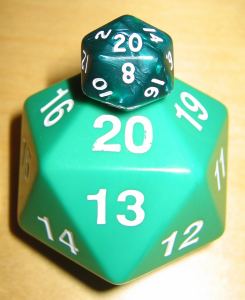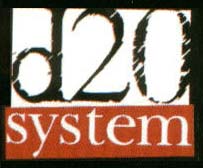D20 System: Difference between revisions
1d4chan>Incassum Fixed up some rather odd wording... |
No edit summary |
||
| Line 9: | Line 9: | ||
Most of the d20 System was released as the System Reference Document ([[SRD]]) under the Open Game License ([[OGL]]) as Open Game Content (OGC), which allows people to make and release supplements for free. This led to multiple game-breaking splatbooks for D&D, and a glut of samey RPGs, mostly because people figured it was worthless to challenge Wizards, and so d20 was soon seen on everygoddamnthing. | Most of the d20 System was released as the System Reference Document ([[SRD]]) under the Open Game License ([[OGL]]) as Open Game Content (OGC), which allows people to make and release supplements for free. This led to multiple game-breaking splatbooks for D&D, and a glut of samey RPGs, mostly because people figured it was worthless to challenge Wizards, and so d20 was soon seen on everygoddamnthing. | ||
Mechanically, d20 is basically a watered down reversed version of the AD&D 2E rules, with huge chunks stolen from Megaversal and SPECIAL, like [[Feat|feats]]. | Mechanically, d20 is basically a watered down reversed version of the AD&D 2E rules, with huge chunks stolen from Megaversal and SPECIAL, like [[Feat|feats]]. However watching it in motion is enough to make a mathematician orgasm. That is because one of the big advantage of the D20 system is that one can break everything into nice easy to understand percentages. Because 20 is exactly 1/5 of 100, it's possible for out comes on a D20 to come out as complete percentage point when trying to determine the odds of something happening. Simply figure out your target number (example: A DC of 10) figure out the number of results that are higher then the number (10), add one since D20 system lets you succeed when you match the result (11), times the result by five and you have your final chance of success unmodified (in this case 55%), lastly each +1 you have gives you an additional 5% chance of success to any roll, simple and elegant. The most complex thing is figuring out how Advantage works when figuring the math out but aside from that it can all be done in one's head or on any phone. As such one, if one can eye ball the possible DC of any challenge that you might be up against you can, within reason, play the odd easily and quickly in your head. Not all systems can say this and the fact that the math of the D20 is so easy benefits both the players who are fast enough to play the angles, and DM's who set up challenges so they know exactly the odds of there players succeed. . .. baring 20 1's in a roll because chaos theory and lady luck work like that some time. | ||
Wizards doesn't use the d20 System any more, as they decided to <s>fail</s> <s>fuck everyone over</s> change the mechanics for [[4e|D&D 4th Edition]]. However, there's still hope for people who [[RAGE]] at 4e, since Paizo Games pretty much stole [[3e|3.5]] and renamed it [[Pathfinder Roleplaying Game|Pathfinder]]. | Wizards doesn't use the d20 System any more, as they decided to <s>fail</s> <s>fuck everyone over</s> change the mechanics for [[4e|D&D 4th Edition]]. However, there's still hope for people who [[RAGE]] at 4e, since Paizo Games pretty much stole [[3e|3.5]] and renamed it [[Pathfinder Roleplaying Game|Pathfinder]]. | ||
Revision as of 07:44, 27 November 2018


The d20 System is a tabletop RPG system that uses, among other things, twenty-sided dice.
Because THAC0 sucked confused stupid people wasn't as intuitive as simple, always-rising numbers, Wizards of the Coast distilled the essence of the D&D mechanics to a more streamlined mechanic.
Most of the d20 System was released as the System Reference Document (SRD) under the Open Game License (OGL) as Open Game Content (OGC), which allows people to make and release supplements for free. This led to multiple game-breaking splatbooks for D&D, and a glut of samey RPGs, mostly because people figured it was worthless to challenge Wizards, and so d20 was soon seen on everygoddamnthing.
Mechanically, d20 is basically a watered down reversed version of the AD&D 2E rules, with huge chunks stolen from Megaversal and SPECIAL, like feats. However watching it in motion is enough to make a mathematician orgasm. That is because one of the big advantage of the D20 system is that one can break everything into nice easy to understand percentages. Because 20 is exactly 1/5 of 100, it's possible for out comes on a D20 to come out as complete percentage point when trying to determine the odds of something happening. Simply figure out your target number (example: A DC of 10) figure out the number of results that are higher then the number (10), add one since D20 system lets you succeed when you match the result (11), times the result by five and you have your final chance of success unmodified (in this case 55%), lastly each +1 you have gives you an additional 5% chance of success to any roll, simple and elegant. The most complex thing is figuring out how Advantage works when figuring the math out but aside from that it can all be done in one's head or on any phone. As such one, if one can eye ball the possible DC of any challenge that you might be up against you can, within reason, play the odd easily and quickly in your head. Not all systems can say this and the fact that the math of the D20 is so easy benefits both the players who are fast enough to play the angles, and DM's who set up challenges so they know exactly the odds of there players succeed. . .. baring 20 1's in a roll because chaos theory and lady luck work like that some time.
Wizards doesn't use the d20 System any more, as they decided to fail fuck everyone over change the mechanics for D&D 4th Edition. However, there's still hope for people who RAGE at 4e, since Paizo Games pretty much stole 3.5 and renamed it Pathfinder.
After their temporary bout of insanity, WotC came to their senses and released 5E, releasing Roleplaying games to the mainstream - and going back to what is clearly a lot of 3.X-sensibilities, with a splash of 4E, and even AD&D thrown in for good measure.